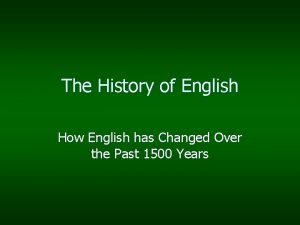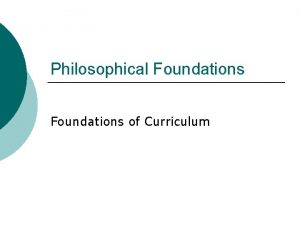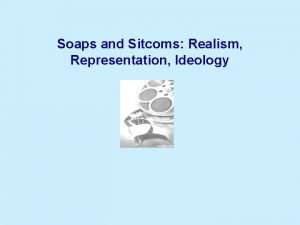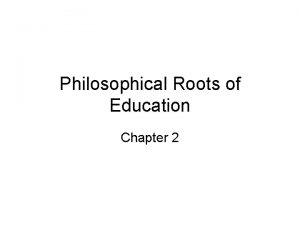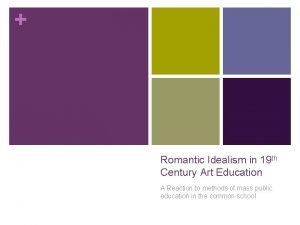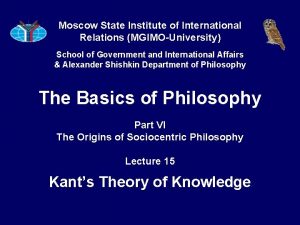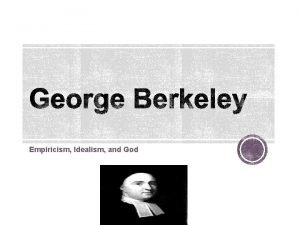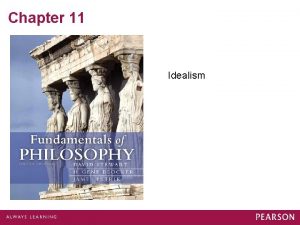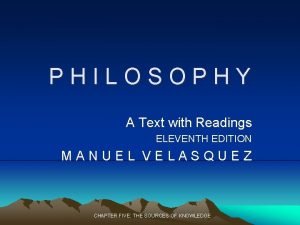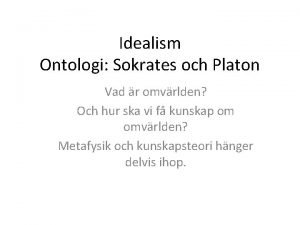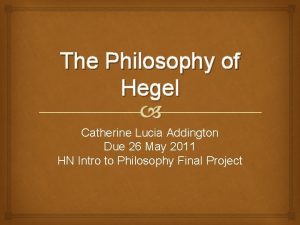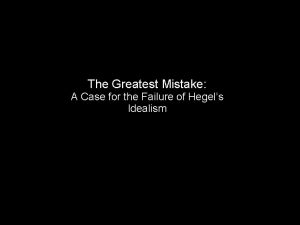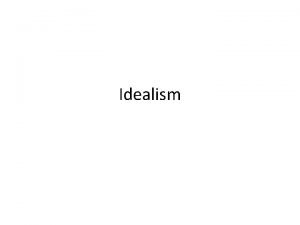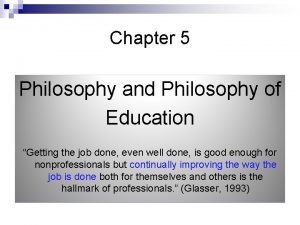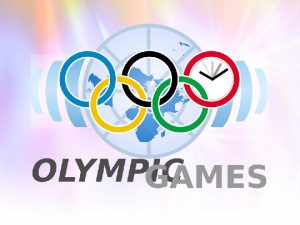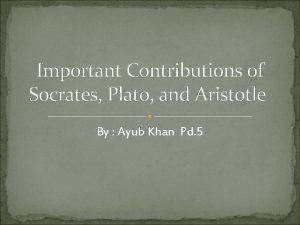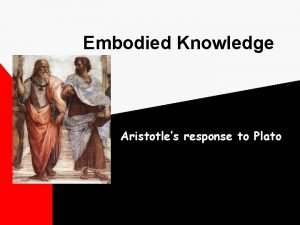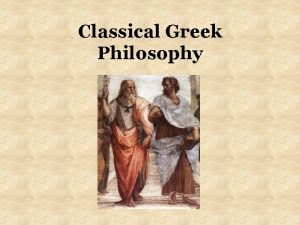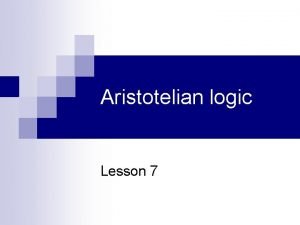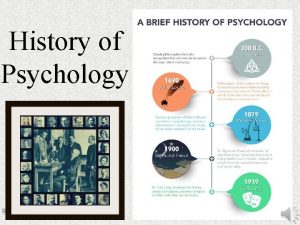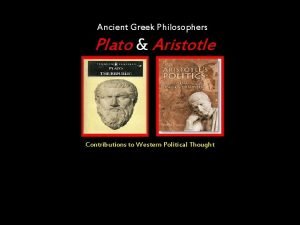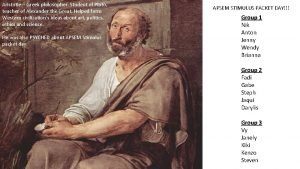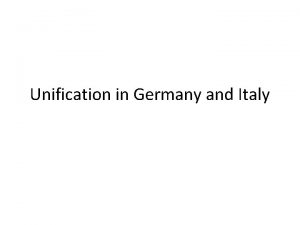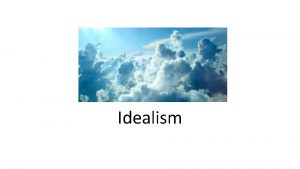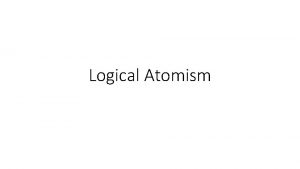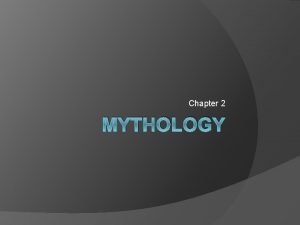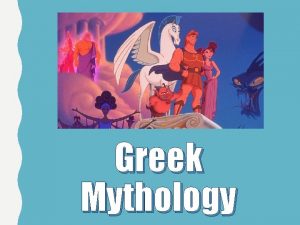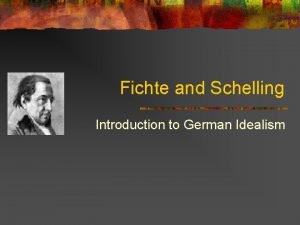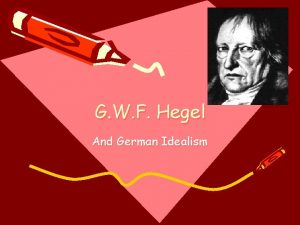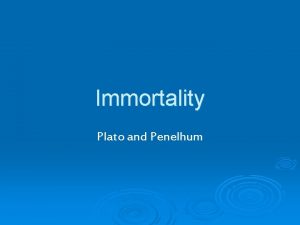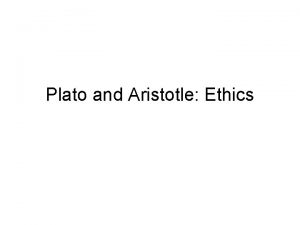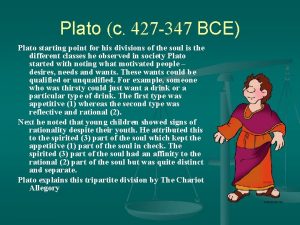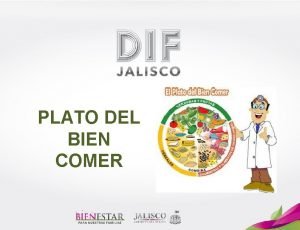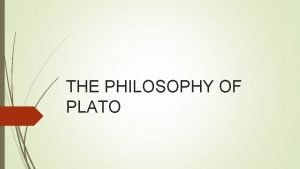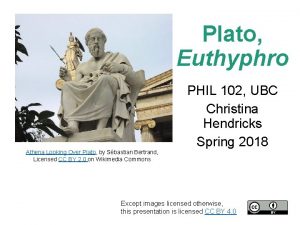Plato and the New Mythology of German Idealism


















































- Slides: 50

Plato and the New Mythology of German Idealism Tae-Yeoun Keum Harvard University

First I will speak of an idea here that, as far as I know, has still not occurred to anyone else. We must have a new mythology, but this mythology must be in the service of the ideas; it must be a mythology of reason. Zuerst werde ich hier von einer Idee sprechen, die, soviel ich weiß, noch in keines Menschen Sinn gekommen ist – wir müssen eine neue Mythologie haben, diese Mythologie aber muß im Dienste der Ideen stehen, sie muß eine Mythologie der Vernunft werden. - Oldest Systematic Program of German Idealism (1795/6)

First I will speak of an idea here that, as far as I know, has still not occurred to anyone else. We must have a new mythology, but this mythology must be in the service of the ideas; it must be a mythology of reason. Zuerst werde ich hier von einer Idee sprechen, die, soviel ich weiß, noch in keines Menschen Sinn gekommen ist – wir müssen eine neue Mythologie haben, diese Mythologie aber muß im Dienste der Ideen stehen, sie muß eine Mythologie der Vernunft werden. - Oldest Systematic Program of German Idealism (1795/6)

First I will speak of an idea here that, as far as I know, has still not occurred to anyone else. We must have a new mythology, but this mythology must be in the service of the ideas; it must be a mythology of reason. Zuerst werde ich hier von einer Idee sprechen, die, soviel ich weiß, noch in keines Menschen Sinn gekommen ist – wir müssen eine neue Mythologie haben, diese Mythologie aber muß im Dienste der Ideen stehen, sie muß eine Mythologie der Vernunft werden. - Oldest Systematic Program of German Idealism (1795/6)

What is new about the new mythology?

• Francis Bacon, “The Wisdom of the Ancients” (1609) // De Sapientia Veterum • Giambattista Vico, The New Science (1725) // Scienza Nuova • Johann Joachim Winckelmann, Thoughts on the Imitation of Greek Works in Painting and Sculpture (1755) // Gedanken über die Nachahmung der griechischen Werke in der Malerei und Bildhauerkunst History of Ancient Art (1764) Kunst des Altertuns (1764) // Geschichte der • Johann Gottfried von Herder, “On the New Use of Mythology” (1767) // Vom neurern Gebrauch der Mythologie

• Goethe • Friedrich Schiller • Johann Gottfried von Herder, “On the New Use of Mythology” (1767) // Vom neurern Gebrauch der Mythologie

“By the time of Goethe it was possible to speak rationally of myth. ” - Christopher Jamme, “Portraying Myth More Convincingly: Critical Approahces to Myth in the Classical and Romantic Periods, ” in International Journal of Philosophical Studies 12, no. 1 (2004): 29 -45, 34.


What is new about the new mythology? 1. The New Mythology 2. The Platonism of the German Romantics 3. Platonic mythology for the new age

1 The New Mythology

What did the German Romantics mean by the new mythology?

The argument of the Oldest Systematic Program for: • the abolition of the state • a new mythology * • The OSP calls for “an ethics” for the coming age. • Ethics as a system of all ideas • However, the state is not an idea. • “We must therefore go beyond the state!”

The argument of the Oldest Systematic Program for: • the abolition of the state • a new mythology * • The state is not one of the ideas that make up the ethics, but other ideas are. • These ideas are subordinate to higher idea: beauty • In the service of the idea of beauty, philosophy must become aesthetic, like poetry. • “The philosophy of the spirit is an aesthetic philosophy. ”

The argument of the Oldest Systematic Program for: • the abolition of the state • a new mythology * • Similarly in the service of the ideas, we must have a new mythology • Just as philosophy must become aesthetic in accordance with the highest idea, • Ideas themselves should be made “aesthetic, i. e. mythological” • “mythology must become philosophical … philosophy must become mythological”

• the abolition of the state • a new mythology

“… through reason itself the overthrow of all superstition…” “…absolute freedom of all sprits, which carry the intellectual world in themselves…” “…the highest act of reason is an aesthetic act since it comprises all ideas…” “Monotheism of reason and the heart…”

• Friedrich Schlegel, “Dialogue on Poesy” (1799) // Gesprach über die Poesie Poetry befriends and bonds all those who love it with indissoluble ties. Alle Gemüter, die sie lieben, befreundet und bindet Poesie mit unauflöslichen Banden.

• Friedrich Schlegel, “Dialogue on Poesy” (1799) // Gesprach über die Poesie Reason is unitary and is the same in everyone; but just as each person has his own nature and his own love, so too does he carry his own poesy inside himself. Die Vernunft ist nur eine und in allen dieselbe: wie aber jeder Mensch seine eigne Natur hat und seine eigne Liebe, so trägt auch jeder seine eigne Poesie in sich.

• Friedrich Schlegel, “Dialogue on Poesy” (1799) // Gesprach über die Poesie Our poesy … lacks a midpoint as mythology was for the poetry of the ancients, and modern poetic art’s inferiority to classical poetic art can be summarized in the words: we have no mythology. Es fehlt. . . unsrer Poesie an einem Mittelpunkt, wie es die Mythologie für die der Alten war, und alles Wesentliche, worin die moderne Dichtkunst der antiken nachsteht, läßt sich in die Worte zusammenfassen: Wir haben keine Mythologie.

• Friedrich Schlegel, “Dialogue on Poesy” (1799) // Gesprach über die Poesie Our poesy … lacks a midpoint as mythology was for the poetry of the ancients, and modern poetic art’s inferiority to classical poetic art can be summarized in the words: we have no mythology. Es fehlt. . . unsrer Poesie an einem Mittelpunkt, wie es die Mythologie für die der Alten war, und alles Wesentliche, worin die moderne Dichtkunst der antiken nachsteht, läßt sich in die Worte zusammenfassen: Wir haben keine Mythologie.

the new mythology provides unity in diversity

the new mythology is • A shared “midpoint” of poetry and of poets • Parallel in Greek mythology (canonical) • Diverse poetry grounded in it (poetry draws from mythology) • Diverse poetry arrive at it (poetry builds up material for mythology) • Celebrates diverse individuality of poetry and its poets • Community-building

• F. W. J. Schelling, System of Transcendental Idealism (1800) // System des transcendentalen Idealismus Philosophy was born and nourished by poetry in the infancy of knowledge, and with it all those sciences it has guided toward perfection. We may thus expect them, on completion, to flow back like so many individual streams into the universal ocean of poetry from which they took their source. Nor is it in general difficult to say what the medium [Mittelglied] for this return of science to poetry will be; for in mythology such a medium existed, before the occurrence of a breach now seemingly beyond repair…


the new mythology is • A shared “midpoint” of poetry and of poets • A midpoint between historical stages of human knowledge (sciences and poetry)


the new mythology is • A shared “midpoint” of poetry and of poets • A midpoint between historical stages of human knowledge (sciences and poetry) • The apparatus of the organic state

• Friedrich Schlegel, “Dialogue on Poesy” (1799) // Gesprach über die Poesie Mythology has one great advantage. What otherwise eternally flees consciousness can be seen here sensually-spiritually and held fast … This is actually the point: because of the highest, we do not depend so entirely on our mind alone. Einen großen Vorzug hat die Mythologie. Was sonst das Bewußtsein ewig flieht, ist hier dennoch sinnlich geistig zu schauen, und festgehalten. . . Das ist der, daß wir uns wegen des Höchsten nicht so ganz allein auf unser Gemüt verlassen.

the new mythology is • A shared “midpoint” of poetry and of poets • A midpoint between historical stages of human knowledge • The apparatus of the organic state • A way of grasping knowledge that escapes conscious reason

“Oldest Systematic Program of German Idealism” (1795/6) // Das älteste Systemprogramm des deutschen Idealismus Finally, the idea that unites all others, the idea of beauty, taking the word in a higher Platonic sense. Zuletzt die Idee, die alle vereinigt, die Idee der Schönheit, das Wort in höherem platonischen Sinne genommen.

the new mythology provides unity in diversity (through the highest ideal) (approximations of the highest ideal)

2 The Platonism of the German Romantics

How do the German Romantics’ Platonism relate to their conception of the new mythology?


This is what it is to go aright, or be led by another, into the mystery of Love: one goes always upwards for the sake of this Beauty, starting out from beautiful things and using them like rising stairs: from one body to two and from two to all beautiful bodies, then from beautiful bodies to beautiful customs, and from customs to learning beautiful things, and from these lessons he arrives in the end at this lesson, which is learning of this very Beauty, so that in the end he comes to know just what it is to be beautiful. - Symposium, 211 c-d

• Friedrich Schlegel, “Dialogue on Poesy” (1799) // Gesprach über die Poesie For Plato, on the other hand, representation and its perfection and beauty are not means, but rather an end in themselves. That is why, strictly speaking, his form is already thoroughly poetic. Dem Plato hingegen ist die Darstellung und ihre Vollkommenheit und Schönheit nicht Mittel, sondern Zweck an sich. Darum ist schon seine Form, streng genommen, durchaus poetisch.

• Friedrich Schleiermacher, Introduction to Plato’s Works (1804) // Einleitung, Platons Werke What is anticipated mythically more often than not appears later in its scientific form. . es wäre im Ganzen mit der hier vorgeschlagenen Folge derselbe Fall, indem nach dieser nicht selten mythisch antizipiert wird, was erst später in seiner wissenschaftlichen Gestalt erscheint.

• Friedrich Schleiermacher, Introduction to Plato’s Works (1804) // Einleitung, Platons Werke Whoever first enters the study of Plato will most distinctly appreciate the gradual development and formation of the Platonic myths out of one Groundmyth … Ja wer erst tiefer in eindringt, dem wird und Ausbildung der Grundmythos. . . am das Studium des Platon die allmähliche Entwicklung Platonischen Mythen aus Einem deutlichsten wahrnehmen läßt.

• F. W. J. Schelling “Timaeus” (1794)

• Friedrich Hölderlin, “Hyperion” (1797 -9) And if I spoke a warm word about ancient Greece, they yawned and declared that one had to live in the present; and another added with an air of significance that still today, good taste had not vanished. … One quipped like a sailor and another puffed out his cheeks and preached maxims.

• Friedrich Hölderlin, “Hyperion” (1797 -9) To ward off flies, that is our work in the future; and to gnaw at the things of the world as children gnaw at the dried iris root, that is our joy in the end. To grow old among youthful people seems to me a pleasure, but to grow old where all is old seems to me worse than all else.

• Friedrich Hölderlin, P r e f a c e t o “Hyperion” (1797 -9) Holy Plato, forgive us! We have sinned greatly against you Heiliger Plato, vergib! Man hat schwer an dir gesündigt

the new mythology provides (with history and the present time) unity in diversity (through the highest ideal) (approximations of the highest ideal)

the new mythology is • A shared “midpoint” of poetry and of poets • A midpoint between historical stages of human knowledge • The apparatus of the organic state • A way of grasping knowledge that escapes conscious reason • A way of understanding the present age

• Friedrich Hölderlin, “Hyperion” (1797 -9) O! nonetheless, nonetheless I would be a stranger on earth, and no god would link me to the past anymore. … So I came among the Germans.

3 Platonic Mythology for the New Age

the task • Needed a new mythology • But they understood mythology in terms of the old, in particular Plato • The new mythology has to do for the present age what Plato’s myths did for his age

the new mythology provides (with history and the present time) | equality unity in diversity (through the highest ideal) (approximations of the highest ideal)

Mythic Platonism for the new age • Written collectively, not just by one person • Need to bring classes together • Need to develop full potential of every individual
 Low german vs high german
Low german vs high german Perennialism
Perennialism Idealism realism
Idealism realism Idealism and education
Idealism and education Romantic idealism
Romantic idealism Transcendental idealism
Transcendental idealism Locke idealism
Locke idealism Berkeley subjective idealism
Berkeley subjective idealism Transcendental idealism
Transcendental idealism Vad är idealism
Vad är idealism Idealism
Idealism Catherine lucia
Catherine lucia Absolute idealism
Absolute idealism Berkeley subjective idealism
Berkeley subjective idealism Axiology of idealism
Axiology of idealism 5 philosophy of education
5 philosophy of education Pierre de coubertin and plato
Pierre de coubertin and plato Aristotle contribution
Aristotle contribution Plato and aristotle differences
Plato and aristotle differences Socrates wife
Socrates wife Aristotelian logic
Aristotelian logic Psychology plato
Psychology plato Plato and descartes
Plato and descartes Greek philosophers worksheet
Greek philosophers worksheet Was aristotle a philosopher
Was aristotle a philosopher German and italian unification compare and contrast
German and italian unification compare and contrast Hình ảnh bộ gõ cơ thể búng tay
Hình ảnh bộ gõ cơ thể búng tay Lp html
Lp html Bổ thể
Bổ thể Tỉ lệ cơ thể trẻ em
Tỉ lệ cơ thể trẻ em Voi kéo gỗ như thế nào
Voi kéo gỗ như thế nào Chụp phim tư thế worms-breton
Chụp phim tư thế worms-breton Chúa yêu trần thế
Chúa yêu trần thế Các môn thể thao bắt đầu bằng tiếng đua
Các môn thể thao bắt đầu bằng tiếng đua Thế nào là hệ số cao nhất
Thế nào là hệ số cao nhất Các châu lục và đại dương trên thế giới
Các châu lục và đại dương trên thế giới Cong thức tính động năng
Cong thức tính động năng Trời xanh đây là của chúng ta thể thơ
Trời xanh đây là của chúng ta thể thơ Cách giải mật thư tọa độ
Cách giải mật thư tọa độ 101012 bằng
101012 bằng Phản ứng thế ankan
Phản ứng thế ankan Các châu lục và đại dương trên thế giới
Các châu lục và đại dương trên thế giới Thơ thất ngôn tứ tuyệt đường luật
Thơ thất ngôn tứ tuyệt đường luật Quá trình desamine hóa có thể tạo ra
Quá trình desamine hóa có thể tạo ra Một số thể thơ truyền thống
Một số thể thơ truyền thống Cái miệng nó xinh thế
Cái miệng nó xinh thế Vẽ hình chiếu vuông góc của vật thể sau
Vẽ hình chiếu vuông góc của vật thể sau Nguyên nhân của sự mỏi cơ sinh 8
Nguyên nhân của sự mỏi cơ sinh 8 đặc điểm cơ thể của người tối cổ
đặc điểm cơ thể của người tối cổ V cc
V cc Vẽ hình chiếu đứng bằng cạnh của vật thể
Vẽ hình chiếu đứng bằng cạnh của vật thể
